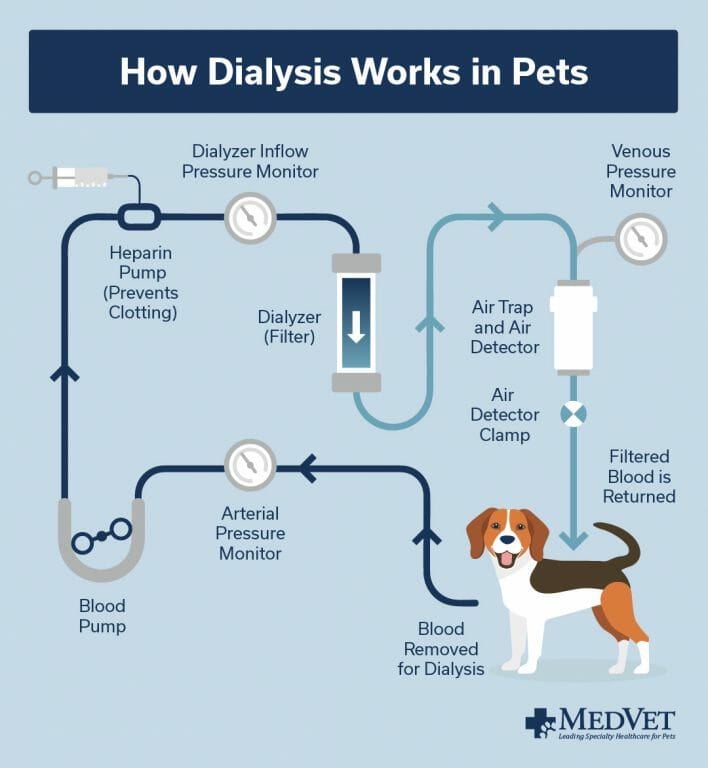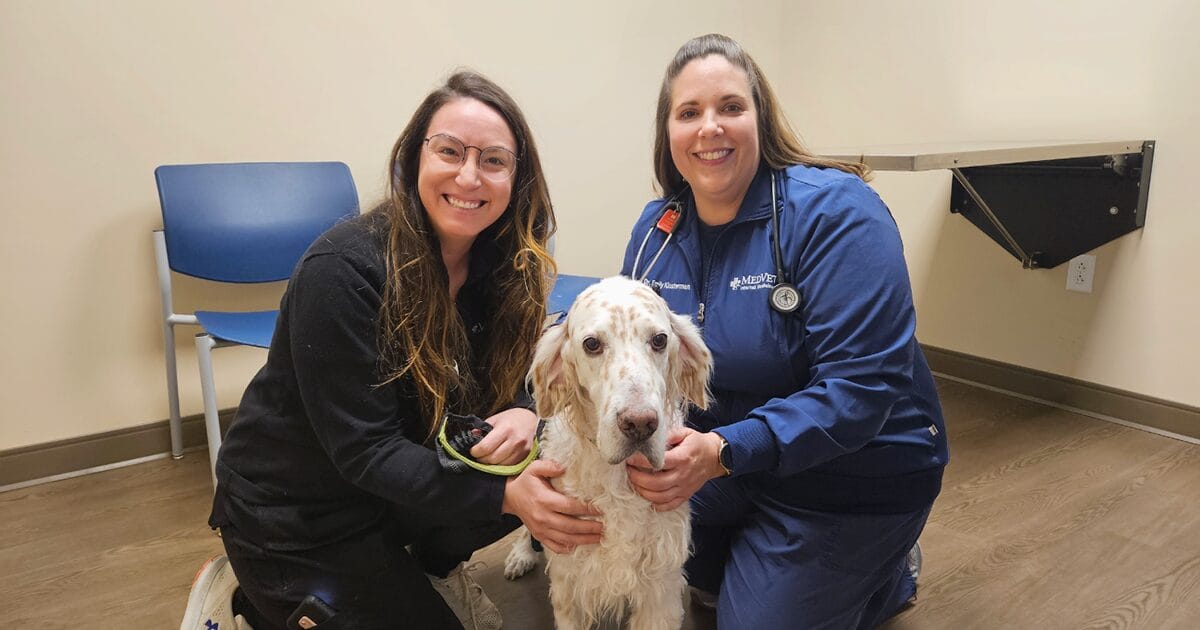How Dialysis Can Help Your Pet
Dialysis removes harmful substances from the blood making it useful for pets with acute kidney failure, autoimmune disease, and toxins.
Did you know that dogs and cats can receive life-saving treatments such as dialysis? Dialysis, or more accurately “extracorporeal therapies,” involves using a specialized machine to pump blood from a patient through a variety of specialized filters and back again. The purpose is typically to remove harmful substances from the blood that are related to, or causing, disease. There are three main reasons to consider dialysis in dogs and cats: acute kidney failure, autoimmune disease, and intoxication.
As part of MedVet’s advanced veterinary care, our critical care team offers dialysis at two locations across the U.S. including MedVet Salt Lake City, and MedVet Silicon Valley.
Acute Kidney Failure
Kidney disease is a common reason people undergo dialysis but it’s a little different in dogs and cats. Most people are prescribed dialysis for chronic kidney disease meaning their kidneys have been damaged and are no longer likely to function properly. In dogs and cats, veterinarians are more likely to use dialysis for acute disease in the hopes that their kidney function will improve. Using dialysis in this situation helps reduce the symptoms a pet is experiencing from acute renal failure and to improve their chances of recovery.
Acute kidney failure can be caused by ischemia or disrupted blood flow. This can come from shock or blood loss, trauma, severe heart disease, anesthetic complications, heat stroke, hypothermia, severe burns, or clotting or thromboembolism.
Autoimmune Disease
Similar to people, dogs and cats can develop autoimmune disease that can be life-threatening in some cases. A variant of dialysis called therapeutic plasma exchange can be used to remove the harmful proteins from the patient’s blood to speed up recovery. These treatments are typically reserved for patients with diseases that aren’t responding to normal medications or diseases that are especially severe.
This can be caused by a variety of primary kidney disease such as kidney cancer or autoimmune disease infections such as leptospirosis or Lyme disease. Many severe systemic infections can also cause a secondary kidney injury.
Intoxication
Sometimes, dogs and cats get into harmful things and dialysis may be the best way to remove a toxin from their blood. Whether dialysis or another form of extracorporeal therapy is successful depends on the toxin ingested and how it behaves in the body. Dialysis has also been used in some situations to treat venomous animal bites.
Toxins can include antimicrobials, chemotherapies, NSAIDS (such as ibuprofen), diuretics, heart medications, or heavy metals. It can also include other common toxins such as grapes or raisins (in dogs), lilies (in cats), antifreeze, pesticides, herbicides, rodenticides, antifreeze, toxic mushrooms, or snake and bee venom.
How Dialysis Works
All forms of dialysis are intended to improve patient comfort, reduce symptoms, and accelerate recovery but they don’t eliminate the need for medications or other treatments. Dialysis is also an intensive treatment, and most pets are hospitalized in critical condition given their illnesses. The doctor overseeing your pet’s dialysis treatments is typically board certified in internal medicine or critical care. They’ll work with your pet’s other doctors to provide comprehensive care even after dialysis treatments are complete.
Here you can see a simplified example of a dialysis system. In humans undergoing chronic dialysis, the blood is typically removed from a modified blood vessel in the arm known as a fistula or graft. In dogs and cats, we place a special dialysis catheter in the jugular vein. Because dogs and cats are so small compared to humans, a large vein is needed in order to pump the blood quickly through the machine.

Dialysis Use for Toxins
In addition to the items listed above, there are many potential toxins that can cause illness in dogs and cats (too many to list!) including over-the-counter medications and other pharmaceuticals. Many of these toxins can be removed with dialysis. If your dog or cat ever ingests something accidentally, it’s always best to consult with a veterinarian immediately to know if emergency care is needed. Here are some helpful tips when you think your pet may have ingested something poisonous:
- Always seek the advice of a veterinarian. You can also reach out to the Pet Poison Helpline at 855.764.7661.
- Don’t induce vomiting unless directed by a veterinarian. In some instances, vomiting a harmful substance can cause more problems.
- Gather as much information as possible about the substance your pet ingested including how much, when, and exactly what the substance is. Be prepared to share information about drugs or other illicit substances as this could help the doctors provide the best possible care for your pet.
- If there is any packaging, please bring it with you. Did you know there are many different types of rat poison? Your veterinarian may only be able to determine the best treatment if they know exactly what your pet ingested.
- Act quickly! When it comes to toxins and poisons, time is of the essence. Some toxins and medications can cause damage quickly and treatments need to be performed rapidly before that happens.
Talk with Your Veterinarian
Given that dialysis is a complicated, time-consuming, and expensive treatment for dogs and cats, the decision to prescribe treatment is very individualized on a case-by-case basis. If you think your pet may benefit from dialysis or have more questions, please contact your veterinarian or schedule a consultation with one of the MedVet hospitals offering these services. We’re happy to discuss your pet’s care and whether dialysis could be right for them.
FAQs
Contents



